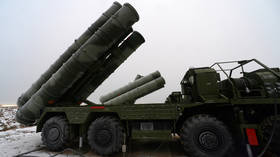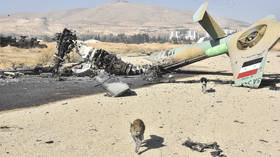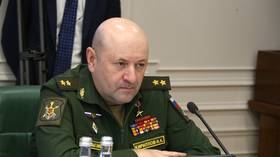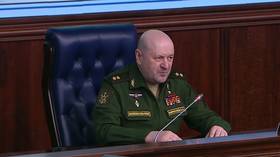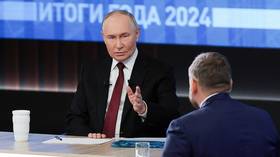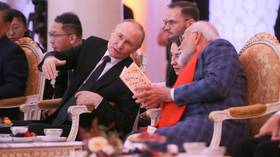We believe US media are controlled by single unit - Ahmadinejad
On his trip to New York to attend the UN nuclear summit Iranian President Mahmoud Ahmadinejad spoke to RT about nuclear non-proliferation, the Obama Administration, Iran’s representation in the US and other hot issues.
[Q] Mr. President, thank you very much for taking the time for sitting with RT during your trip to New York City. Sir, I’d like to begin by asking you why you decided to personally make this trip to New York, to address to the international body about the Nuclear Non-Proliferation Treaty rather than sending Iran’s foreign minister or another top official from your administration?
[A] In the name of God, the Compassionate, the Merciful. I believe that the conference held today at the United Nations represents one of the most important gatherings in the world. Security is one of the most predominant issues nations and societies face, and the largest threat for security is from nuclear weapons. The world has been living under the threat of nuclear weapons annihilation for close to sixty years. Now, a lot of attempts have been made to reduce the threat, but they have been unsuccessful. The scale of the threats these days is far larger than it was 60 years ago, and as long as there are threats, real progress and real welfare cannot prevail. So this current conference is very important for those reasons, and I thought that with my presence I will be able to assist the conference in arriving at better decisions and more comprehensive ones. So I considered it my responsibility as one member of this human society to be there today. I believe that if other colleagues of mine had understood the importance and significance of the gathering, they, too, would have participated.
[Q] There was a participation in Washington, D.C., a few weeks back, when President Obama hosted a nuclear security summit. It is clear that the relations between Iran and the United States have not thawed under the leadership of Barack Obama. President Obama promised to engage Iran in a way that the Bush Administration did not. What is your standpoint? What is the difference between President Obama and his predecessor?
[A] Well, one big difference is that Mr. Obama has said that he would like to bring change. So we are waiting for those significant changes to take place. However, we think that there are too many differences of opinion that prevail in the United States, so it would be very difficult for Mr. Obama to carry out his viewpoints on all policy matters. I believe that differences within the ruling system of the United States administration and government are indeed very strong. At times, contradictory statements come from it. Some are very radical in their statements, some seem to be very slow in grasping what they need to say. So we certainly hope that some changes will occur.
[Q] Just to understand, the difference between President Obama and the former president is that President Obama says he wants to make change?
[A] Yes, but of course there are many differences between the two. Their demands, their positions for those demands are different. Mr. Bush represented a partisan, party-system-based element that was deep-rooted in American politics with a large network of its own. Within that partisan system he had tremendous influence. His father was a president too, so their family has a lot of influence. But Mr. Obama is a newcomer at that level and does not carry the same influence over his party as Mr. Bush did over his. But on the other hand, Mr. Obama had the support of the people. So they are different.
[Q] Speaking of the people, Mr. President, do you think that Americans have a wrong impression of you? Are you possibly misunderstood by your critics?
[A] What misrepresentation? In what area? It’s possible… I mean, after all we’ve had from the past differences with the U.S. government. Consecutive U.S. administrations have worked against our interests and in the U.S. large segments of the media are controlled by parties… by partisan groups, so when those parties are in conflict with us, it’s natural that the media also takes their direction. We like the American people, and we like all people from all nationalities, so I don’t see us having any problems with people.
[Q] I’d like to follow-up on that comment about the media. [Are there] any specific organisations that you feel target Iran in a particular way?
[A] You see, for example, this must probably be the sixth time that I come to New York, and I have given interviews to various U.S. media reps. And almost all the six times that I’ve come here, their questions are almost the same. So, if their questions are all the same, there are only a few possibilities. “A” – either they agree on so many issues that all the concerns they have are similar. “B” – that they have regular gatherings to co-ordinate their questions. So it can be “either or”. The third possibility is that they are controlled from a single unit. We think it’s the third possibility.
[Q] What’s the most common question they will ask?
[A] Well, for a period it was mostly about Middle Eastern issues and the Holocaust.
[Q] Constantly being attributed to you in the Western media is that you, Mr. President, have said, and you’re often quoted as saying that ‘Israel needs to be wiped off the map’. Often times it’s interpreted that people in your country say ‘Death to Israel! Death to America!’ That’s the way the American media translate that. Did you actually say that Israel needs to be wiped off the map – to say on record straight?
[A] Our position on Palestine and what we have said is very clear about it. We’ve said that 60 years of conflict, and various peace proposals have failed to give results. We say that we must allow people there to determine their own future. As a result, we’ve proposed a free referendum, to allow people to decide their own fate. Here they say that if there is a free referendum, the Palestinians will definitely prevail, and then the Zionist regime can no longer exist. We say well, let’s just give the people their chance to choose for themselves. It’s their right to choose.
[Q] I understand you’ve said. But did you say those quotes that I brought up?
[A] Frankly, what I've said is what you hear right now. That's it. I mean, maybe if there is a referendum, it may well lead to that cult, but people should decide.
[Q] So, your words were misinterpreted then?
[A] That's a possibility.
[Q] Your visit here in New York, to the United Nations, to address the international body does coincides with a US push for the fourth round of sanctions against your country. It looks as though for recent statements that the US may be victorious. How do you think it’s going to play out?
[A] Well, I explained the main reason why I was here. My presence here is to follow a larger goal, the humane goal, the one that is global. We are not concerned by sanctions. Of course, we don't welcome them, but we are not concerned by them either. We believe they are oppressive and unjust. But just the fact that you mention that the United States is putting a lot of pressure means that what they have chosen to do is illegal, unlawful, and unfair. If in fact it is in line with international law, there is no need to put pressure to bring so much pressure on it to happen. The fact that there is pressure means that decisions that are made regarding sanctions are not democratic ones. Decisions are of value only when they are made freely. When it is done under pressure by a power, it is naturally undemocratic. And when it is undemocratic, it cannot be accepted so easily. And several consequences occur. The credibility of such decisions gets lost. The credibility of international organizations is reduced. We believe that there is a group that is trying to bring Mr. Obama closer to clash with Iran or stand against Iran. When Mr. Obama is placed in the position of clashing with Iran, then his motto for change is lost. Mr. Bush used to pass resolutions against us. Where did it go? Where did it take him? Where are we today and where is he today? Iran is still advancing, and he is gone.
[Q] You point out often the credibility problem the United Nations has. In your speech you noted the dissatisfaction you have with the IAEA, the flaws that you believe the United Nations has, in being, actually, democratic, in being fair and just to all member states. And many people agree with you inside this country now. Not everybody is a fan of the United Nations or feel that the United Nations is fair to all member states. Having said that, why is Iran still engaged with the United Nations, if you feel that there are so many problems and so many contradictions, and it’s so unbalanced in terms of its fairness?
[A] Well, the answer to your question is clear, because we consider ourselves a member state of these organizations, and therefore incumbent upon us to improve their structures. We don't believe that we can help improve the structure of these organizations by not engaging with them. And in fact there are many member states who agree with us on this. We talk, we share opinions, and we make efforts to improve their structures. If you were here at the event, at the conference today or if you go again tomorrow, you will find that many member states happen to agree with Iran's positions. These are not issues that happen overnight. It is a result of the discussions, the travels made, the consensus that we seek to build with everyone that comes about. There are others who also believe that these organizations do not fully carry out their responsibilities. They, too, have gathered over the years to discuss, share opinions, and today have arrived at a point where they believe that the Nuclear Non-Proliferation Treaty has to improve and be revised. So revisions and reforms happen gradually. But destruction can take place quickly, in one instance.
I mentioned that my presence in New York, I view it, is for higher purposes. The revision of the NPT is far more important an issue than issues pertaining to one member state or country alone. If the whole world is revisited and reviewed, and revised, then everyone benefits. All we do on our part is discuss and explain what we see is happening. The way we see Iran’s role, it is a country that never brings pressure on others to force them to revisit their policies. So we are in favour of just talking with everyone to express ourselves and inform others of our views and reasons. It's up to others and they have the freedom to choose whether they want to accept what we say or not. Obviously, we can't impose it on them to accept it, but we also know that the vast majority of the countries there agree with us. 118 member states of the Non-Aligned Movement have issued declarations in our favour. But the veto power given to the permanent members of the UN Security Council creates an imbalance in decisions and creates injustice in the UN efforts to establish security for all. It takes out the democratic nature of the Security Council. And on top of that you add the pressure that some member states bring on the Security Council, it worsens the situation far more.
[Q] There are two non-permanent members of the [UN] Security Council – Brazil and Turkey, who have spoken out against sanctions against your country. And most recently, the foreign ministers of those countries, at least one of them, is quoted as saying that upon your arrival here, in your address to the international body, it is so important for Iran to assure the international community that its nuclear programme is only for peaceful purposes.
Do you feel confident that when you leave New York, every member state of the United Nations will rest assured that Iran’s nuclear programme is only for peaceful purposes?
[A] I can tell you that our relations with Brazil and Turkey are very good ones, and they are trying to assure that no resolutions are issued against us. And that’s because of the friendship between us. Otherwise they are under pressure, too.
I hope that a day will arrive so that pressure will no longer yield any results in international relations and will be replaced by logic and reason.
And I tell you that that day is not too far from now.
[Q] Mr. President, I would like to know – in your view, what would have to happen for Iran and the United States to reconcile their relationship after so many decades of a rift?
What, in your opinion, should happen? It is important. Yes, off-camera, too.
[A] Oh, my opinion is not important. You know, I think a lot has to happen. Real changes have to happen. Real changes.
[Q] Specifically?
[A] In behaviour. Behavioural ones. Attitudinal ones. Outlook ones. We do want it to happen. But we don’t believe that the United States holds the capacity for that to happen, because decisions aren’t centralized here in the United States. There are so many groups that influence decision-making and interfere – the lobby groups… There are various groups.
And even within the administration you see a lot of differences. Big revisions require big decisions. And big decisions need powerful individuals who can make those decisions and then carry through with them. The current structures of the United States governance system do not allow for them to happen right now.
There are groups that want the Middle East to always have wars so that they continue to sell weapons there. Obviously they have no interest in seeing, you know, conflicts end. I mean, if there is peace and peace in the Middle East, where are they going to sell weapons to? And weapons are for war. Not for peace, for war. If there is going to be no war, there should not be any weapons either.
[Q] And that’s where I would like to ask my final question to you. In your speech to the international body today you said the possession or production of a nuclear bomb is not a source of pride. It is rather disgusting or shameful. Last month it was reported in many media outlets that Iran announced that it would soon become a member of the Nuclear Club.
Can you explain to me the difference of Iran being member of the Nuclear Club, if that is in fact true, and you saying that possession or production of a nuclear bomb is disgusting and shameful?
[A] I don’t recall saying this exactly a month ago. I actually said this three years ago.
[Q] But it was quoted that within one month of the announcement which happened to coincide with the Nuclear Security Summit in DC – that’s when the announcement was made – in mid April – bringing us to mid May – Iran become a member of the Nuclear Club.
[A] Maybe the media may have recorded me on that again. But did they give you a response today on my remarks? Nuclear energy has various applications. One is for power purposes – to generate electric power, electricity. Another is for medical purposes and for cures. Another part is for the industrial and agricultural sector. Another part is difficult to identify very difficult diseases and to treat them. And many other applications that are very useful.
Now, one deviation, or application, is the bomb. If you have the capacity to enrich fuel in order to use the positive applications that you have, that qualifies you as a member of the nuclear club.
The nuclear club is not an officially registered club. It’s just an expression of sorts. Anyone with the capacity is called a member of the club.
There I said, ‘Nuclear bomb for no one, nuclear energy for everyone.’ We use nuclear energy, we cannot accept the bomb option. So, we are a nuclear state but one for peaceful purposes.


